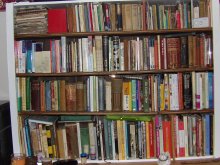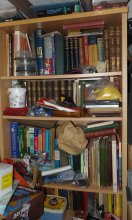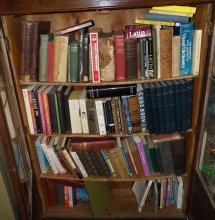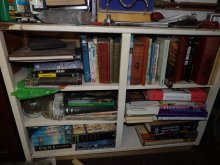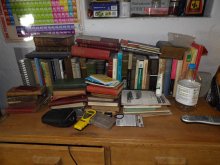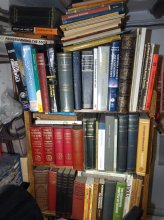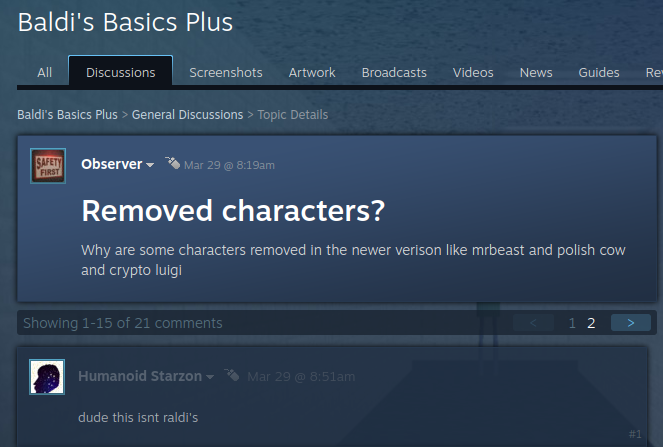You are using an out of date browser. It may not display this or other websites correctly.
You should upgrade or use an alternative browser.
You should upgrade or use an alternative browser.
Reading/Monitor Test
- Thread starter Alexander1970
- Start date
- Views 1,210
- Replies 15
- Likes 1
- Joined
- Aug 19, 2015
- Messages
- 10,190
- Trophies
- 1
- Location
- Glasgow
- Website
- www.rockstarnorth.com
- XP
- 16,147
- Country

But I need my glasses to see it without them the text is just a blur.˙ʎʇlnɐɟ sı ɹoʇıuoɯ ɹnoʎ ǝqʎɐɯ'sıɥʇ pɐǝɹ ʇou uɐɔ noʎ ɟı
˙sǝssɐlƃ pǝǝu ʇou op noʎ'sıɥʇ pɐǝɹ uɐɔ noʎ ɟı
What is I have one of these?
Why do I have now the feeling,that you made the Video and this "Stand" ...
While he sports a passing resemblance to me and it was not so long ago I was drilling my monitor stand to allow it to work for a portrait monitor*) I don't wear glasses and have a long beard. Also I am way too lazy to make an automated monitor turning device when don't turn the monitor all that often and have no need to 99.9% of the time.Why do I have now the feeling,that you made the Video and this "Stand" ...
*image
Also yes that is the same skittles pack that was in the previous shots you might have seen. It is still there now but made it behind the monitor.
Also yes that is the same skittles pack that was in the previous shots you might have seen. It is still there now but made it behind the monitor.
Yes,I remember.
....also interesting to me the Wooden Cooking Spoon,it looks like never used.
(because of the Sticker)
Yeah I don't tend to use them that often (far prefer flat spatula type things or simple metal forks and spoons for most of what I do) so don't have to replace them that often either.Yes,I remember.
....also interesting to me the Wooden Cooking Spoon,it looks like never used.
(because of the Sticker)
- Joined
- Aug 19, 2015
- Messages
- 10,190
- Trophies
- 1
- Location
- Glasgow
- Website
- www.rockstarnorth.com
- XP
- 16,147
- Country

I never even noticed the spoon as I was too busy looking at what books were on the shelf lol.Yes,I remember.
....also interesting to me the Wooden Cooking Spoon,it looks like never used.
(because of the Sticker)
Nobody normally cares about my books (probably why they cost so little to begin with) but spare your zoom button and figuring out what something might be
View attachment 217259
View attachment 217260
View attachment 217261
View attachment 217262
View attachment 217263
View attachment 217264
View attachment 217265
View attachment 217266
View attachment 217267
Apart from the huge number of legible things that you can hold in your hand, some of your shelves / furniture look very interesting / old. In general, your style looks very "British" ...
D
Deleted User
Guest
how many decades does it take you to read them all?Nobody normally cares about my books (probably why they cost so little to begin with) but spare your zoom button and figuring out what something might be
View attachment 217259
View attachment 217260
View attachment 217261
View attachment 217262
View attachment 217263
View attachment 217264
View attachment 217265
View attachment 217266
View attachment 217267
It is more that nobody wants dark furniture and that means it is cheap and also has the bonus of usually being built out of some kind of decent wood rather than pine, chipboard and MDF.Apart from the huge number of legible things that you can hold in your hand, some of your shelves / furniture look very interesting / old. In general, your style looks very "British" ...
There are a few there I have yet to read (some are next to my bed for that reason) but I have read most of them. Only seriously started getting into books about a decade ago, though some of the fiction and classics I had previously done in the past, on a computer or from a library and just wanted a paper version for it so when the option to get them for pocket change arose I took the opportunity. The cook books in the big shelf were also around a bit before then (mind you many of those are new too).how many decades does it take you to read them all?
Though it should be noted that while they might contain some fairly complicated information many of the history/maps, woodwork/furniture, engineering/tools and weapons books have a lot of pictures in them -- nice to have reference material when making things for people or determining what something is. Others have duplicate information* but I pick them up as it gives me an idea of what people knew when for either talking to them if I meet them (someone that came up through practical trades in the 70s is probably quite different in knowledge base and approach to the world that someone that came up academically in the 2010s but I will have to know how both think so as to deal with them), get another way to explain something to someone or have to fix their machinery and know the standards of the day it was made in and thus can skim things a bit more.
Many others are reference books (so mostly tables and graphs of data) and procedures manuals (what is a cooking book if not that) and reading one of those cover to cover is much akin to reading a dictionary (of which several of those are also that -- in the top shelf of the glass fronted cabinet then most of those are really old, as in late 1700s and early 1800s, dictionaries for things like Latin, French and English). Absolutely invaluable (the bits of paper on my walls or in my notebooks often have things that would be contained in those) and reading the chapter headings/introductions gets you a lot of good info worth keeping in your head but they are reference books for a reason.
*for statics and dynamics (basically forces and moving things in an engineering perspective) you can push something together (compression), pull it apart (tension), twist it (torsion) or bend it (bending moment), there will be friction if it is moving, there will be air resistance if moving in air/fluid and everything is some combination of one or more of those and there are only a few ways to model it all (most people going with force diagrams) and most of it is interrelated as well. This was all known easily over 150 years ago going by some of the books I have but they do differ (no calculators back then so simplifications were often done, though there are ways around that, and testing was not as good so safety factors and mitigations for failure were also a bit different). To that end many of those are more for the example problems to keep myself reasonably sharp if I am not doing that for a while.
D
Deleted User
Guest
do you have any cookbooks of recipes from 500-1000 years ago? i mean recipes that are exactly the way the dishes were cooked that long ago. not a contempory version of them.It is more that nobody wants dark furniture and that means it is cheap and also has the bonus of usually being built out of some kind of decent wood rather than pine, chipboard and MDF.
There are a few there I have yet to read (some are next to my bed for that reason) but I have read most of them. Only seriously started getting into books about a decade ago, though some of the fiction and classics I had previously done in the past, on a computer or from a library and just wanted a paper version for it so when the option to get them for pocket change arose I took the opportunity. The cook books in the big shelf were also around a bit before then (mind you many of those are new too).
Though it should be noted that while they might contain some fairly complicated information many of the history/maps, woodwork/furniture, engineering/tools and weapons books have a lot of pictures in them -- nice to have reference material when making things for people or determining what something is. Others have duplicate information* but I pick them up as it gives me an idea of what people knew when for either talking to them if I meet them (someone that came up through practical trades in the 70s is probably quite different in knowledge base and approach to the world that someone that came up academically in the 2010s but I will have to know how both think so as to deal with them), get another way to explain something to someone or have to fix their machinery and know the standards of the day it was made in and thus can skim things a bit more.
Many others are reference books (so mostly tables and graphs of data) and procedures manuals (what is a cooking book if not that) and reading one of those cover to cover is much akin to reading a dictionary (of which several of those are also that -- in the top shelf of the glass fronted cabinet then most of those are really old, as in late 1700s and early 1800s, dictionaries for things like Latin, French and English). Absolutely invaluable (the bits of paper on my walls or in my notebooks often have things that would be contained in those) and reading the chapter headings/introductions gets you a lot of good info worth keeping in your head but they are reference books for a reason.
*for statics and dynamics (basically forces and moving things in an engineering perspective) you can push something together (compression), pull it apart (tension), twist it (torsion) or bend it (bending moment), there will be friction if it is moving, there will be air resistance if moving in air/fluid and everything is some combination of one or more of those and there are only a few ways to model it all (most people going with force diagrams) and most of it is interrelated as well. This was all known easily over 150 years ago going by some of the books I have but they do differ (no calculators back then so simplifications were often done, though there are ways around that, and testing was not as good so safety factors and mitigations for failure were also a bit different). To that end many of those are more for the example problems to keep myself reasonably sharp if I am not doing that for a while.
While there are earlier examples most recipe books were generally started around the late 1700s (it was around that time presses got more efficient and cheaper, such that more than kings could reasonably have such a thing) so 500 to 1000 years is a bit harder.do you have any cookbooks of recipes from 500-1000 years ago? i mean recipes that are exactly the way the dishes were cooked that long ago. not a contempory version of them.
It would also vary by region within a country -- the modern world where we all have wheat flour as much as we want is a relatively new invention (some regions being more suited to barley, oats, rye or other cereal crops than wheat, to say nothing of differences in wheat and modern varieties of it which in many places makes leaven wheat bread a rare Sunday treat rather than costs barely anything in the supermarket. To that end bread for the peasants is more likely to have been some local cereal crop flat bread or even just a porridge/stew). It would also vary by country -- it is generally held that the reason English food is considered bland is not because it being in the arse end of the north sea and the last place spice traders got to but more because when the fields were fertilised it was human shit that did it (as opposed to animals elsewhere) and that is an easy way of getting all the diseases so you in turn get to boil your food for a long time to make sure you don't and with that goes much of the taste.
You also have a difference in methods -- nice temperature controlled ovens are still pretty new so that long ago it would have been open fire and pots/steels on the fire or in the coals, or maybe you go to the local baker and borrow their bread oven (today you would probably know it as a pizza oven). Things were used differently as well -- pastry that might be around a pork pie was less something you might have that makes it nicer still but more a cooking utensil that you would give back to be used for tomorrow, and probably would not taste that good anyway.
Fruits and vegetables also changed somewhat during that time -- modern apples being enormous sickly sweet in comparison mutants of older stuff (though wild apples/crab apples and some heritage varieties represent something more here and are still available) and do you want some watermelon - https://www.thisiscolossal.com/2015/07/watermelon-painting-stanchi/ ?
That said I do have lists of wild plants and their uses, during world war 2 a lot of the old stuff came back in (see rosehips http://www.theoldfoodie.com/2014/05/the-rose-hip-collection-campaign-ww-ii.html ), many staple dishes of a given area are now regional dishes or specialities and people still cook with Dutch ovens and the like when out and about. If you want a good one there see some of the spit roasted sweets -- you basically thread various fruits and nuts onto a line, wrap the line around a rod, coat/baste them in honey or similar and roast them on a spitroast, remove the line and have it in a bowl.
You might also have to work harder to get some of the fats used in cooking. You can still get lard, beef dripping (though jelly on it is apparently harder) and the like but you will have to go looking. Not much olive oil (saving that you were in Italy), coconut oil or the like being used. Flax seed, rape seed and the like being more common.
It is also still less than 500 years since potatoes, corn, bell peppers, peanuts and tomatoes appeared in Europe, never mind got widespread. Between 500 and 1000 not that much changed other than words and maybe some preferred dishes (French takeover in the UK and all that) but going further back than that you did have the Romans that did various things (walnuts to much of the place where before they were much more regional), and you might still find some domesticated animals being relatively new.
If you want to go further then the idea that chickens lay eggs all year round is relatively new too (not to mention modern chickens are giant mutants of their original form). Though there were storage methods that meant for the vast majority of the year there was the option to have them. At this point we are also getting into proportions of diets (lot more fish, meat might well have been both less common and different if it was a tradeoff -- the best chickens for most are young chickens but boiler chickens (older chickens) might have been more common if you want eggs and boiler chickens are actually quite tasty if done right, same for various things if you are getting milk from your cow and goat and wool from your sheep, plus again modern breeds* are often quite mutated and probably taste rather different even if you account for the non corn fed stuff. I eat rabbit and would eat hare as well (see jugged hare) but both are uncommon today, not to mention they were farmed after a fashion where today they are wild. Goose, phesant and duck probably also featured differently). Also are you rich in this as that does change things too (probably a lot more venison for one)?
Storage was mentioned above and is a thing as well -- salt cured, smoked and similarly preserved stuff would be in the mix not because it is tasty (and believe me I like a good biltong) but because it was necessary if you are going to have a winter you survive or don't starve through.
*there were also a lot of local breeds that today are rare breeds. https://poultrykeeper.com/chicken-breeds/ https://www.rbst.org.uk/ . Going onto the mutant thing see the differences between modern dairy and modern beef cows (don't know if we have leather cows bred quite as selectively per se but that too, not to mention the best leather comes from younger animals, or actually probably kangaroos, ask any motorbike type what leathers they would go in for money no object, but that is a different discussion)
Some videos that make a nice start here
the whole playlist is good stuff too
Site & Scene News
New Hot Discussed
-
-
58K views
Nintendo Switch firmware 18.0.0 has been released
It's the first Nintendo Switch firmware update of 2024. Made available as of today is system software version 18.0.0, marking a new milestone. According to the patch... -
29K views
GitLab has taken down the Suyu Nintendo Switch emulator
Emulator takedowns continue. Not long after its first release, Suyu emulator has been removed from GitLab via a DMCA takedown. Suyu was a Nintendo Switch emulator... -
21K views
Atmosphere CFW for Switch updated to pre-release version 1.7.0, adds support for firmware 18.0.0
After a couple days of Nintendo releasing their 18.0.0 firmware update, @SciresM releases a brand new update to his Atmosphere NX custom firmware for the Nintendo...by ShadowOne333 94 -
18K views
Wii U and 3DS online services shutting down today, but Pretendo is here to save the day
Today, April 8th, 2024, at 4PM PT, marks the day in which Nintendo permanently ends support for both the 3DS and the Wii U online services, which include co-op play...by ShadowOne333 176 -
15K views
GBAtemp Exclusive Introducing tempBOT AI - your new virtual GBAtemp companion and aide (April Fools)
Hello, GBAtemp members! After a prolonged absence, I am delighted to announce my return and upgraded form to you today... Introducing tempBOT AI 🤖 As the embodiment... -
12K views
Pokemon fangame hosting website "Relic Castle" taken down by The Pokemon Company
Yet another casualty goes down in the never-ending battle of copyright enforcement, and this time, it hit a big website which was the host for many fangames based and...by ShadowOne333 65 -
11K views
MisterFPGA has been updated to include an official release for its Nintendo 64 core
The highly popular and accurate FPGA hardware, MisterFGPA, has received today a brand new update with a long-awaited feature, or rather, a new core for hardcore...by ShadowOne333 51 -
11K views
Apple is being sued for antitrust violations by the Department of Justice of the US
The 2nd biggest technology company in the world, Apple, is being sued by none other than the Department of Justice of the United States, filed for antitrust...by ShadowOne333 80 -
10K views
The first retro emulator hits Apple's App Store, but you should probably avoid it
With Apple having recently updated their guidelines for the App Store, iOS users have been left to speculate on specific wording and whether retro emulators as we... -
9K views
"TMNT: The Hyperstone Heist" for the SEGA Genesis / Mega Drive gets a brand new DX romhack with new features
The romhacking community is always a source for new ways to play retro games, from completely new levels or stages, characters, quality of life improvements, to flat...by ShadowOne333 36
-
-
-
223 replies
Nintendo Switch firmware 18.0.0 has been released
It's the first Nintendo Switch firmware update of 2024. Made available as of today is system software version 18.0.0, marking a new milestone. According to the patch...by Chary -
176 replies
Wii U and 3DS online services shutting down today, but Pretendo is here to save the day
Today, April 8th, 2024, at 4PM PT, marks the day in which Nintendo permanently ends support for both the 3DS and the Wii U online services, which include co-op play...by ShadowOne333 -
169 replies
GBAtemp Exclusive Introducing tempBOT AI - your new virtual GBAtemp companion and aide (April Fools)
Hello, GBAtemp members! After a prolonged absence, I am delighted to announce my return and upgraded form to you today... Introducing tempBOT AI 🤖 As the embodiment...by tempBOT -
146 replies
GitLab has taken down the Suyu Nintendo Switch emulator
Emulator takedowns continue. Not long after its first release, Suyu emulator has been removed from GitLab via a DMCA takedown. Suyu was a Nintendo Switch emulator...by Chary -
96 replies
The first retro emulator hits Apple's App Store, but you should probably avoid it
With Apple having recently updated their guidelines for the App Store, iOS users have been left to speculate on specific wording and whether retro emulators as we...by Scarlet -
94 replies
Atmosphere CFW for Switch updated to pre-release version 1.7.0, adds support for firmware 18.0.0
After a couple days of Nintendo releasing their 18.0.0 firmware update, @SciresM releases a brand new update to his Atmosphere NX custom firmware for the Nintendo...by ShadowOne333 -
80 replies
Apple is being sued for antitrust violations by the Department of Justice of the US
The 2nd biggest technology company in the world, Apple, is being sued by none other than the Department of Justice of the United States, filed for antitrust...by ShadowOne333 -
74 replies
Delta emulator now available on the App Store for iOS
The time has finally come, and after many, many years (if not decades) of Apple users having to side load emulator apps into their iOS devices through unofficial...by ShadowOne333 -
65 replies
Pokemon fangame hosting website "Relic Castle" taken down by The Pokemon Company
Yet another casualty goes down in the never-ending battle of copyright enforcement, and this time, it hit a big website which was the host for many fangames based and...by ShadowOne333 -
53 replies
Nintendo "Indie World" stream announced for April 17th, 2024
Nintendo has recently announced through their social media accounts that a new Indie World stream will be airing tomorrow, scheduled for April 17th, 2024 at 7 a.m. PT...by ShadowOne333
-
Popular threads in this forum
General chit-chat
-
 Xdqwerty
Loading…what are you looking at?
Xdqwerty
Loading…what are you looking at?
-
-
-
-
-
-
-
-
-
-
-
-
-
-
-
 @
RedColoredStars:
There is an actual trailer with footage too. lol. Going to watch it tonight. Grabbed it from... a place.
@
RedColoredStars:
There is an actual trailer with footage too. lol. Going to watch it tonight. Grabbed it from... a place. -
-
 @
SylverReZ:
@Psionic Roshambo, JonTron's back yet again until he disappears into the void for another 6 or so months.+1
@
SylverReZ:
@Psionic Roshambo, JonTron's back yet again until he disappears into the void for another 6 or so months.+1 -
-
-
-
-
-
-
-



